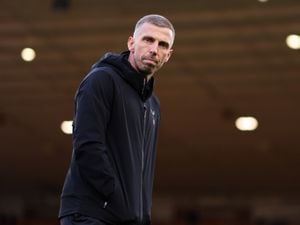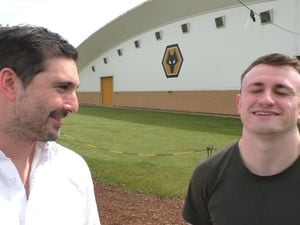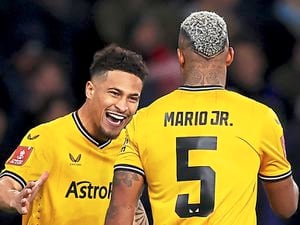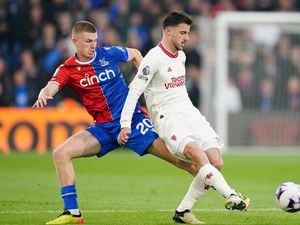Stephen Hunt: Age is just a (wrong) number
The conversation with Stephen Hunt started something like this.
“Just noticed you’ve got a big birthday coming up, fancy doing an interview? Life begins at 40 and all that? A chat about your career and what you are up to now?”
“Well I have got a birthday coming up,” comes the reply.
“But I wouldn’t say turning 41 is a big birthday, would you?”
August 1st, 1981. That’s the date of Hunt’s birthday listed on Wikipedia and pretty much most of the other footballing and statistics websites knocking about these days.
It has been that way throughout his career and yet, he was actually born a year earlier, in 1980.
“Kevin Doyle finds it hilarious,” Hunt says of his former Reading, Wolves and Republic of Ireland team-mate.
“He thinks I have done it myself, tried to be clever and changed Wikipedia to take a year off.
“He can’t stop taking the p***, particularly when I’d got into my thirties – it didn’t seem to bother him that much when I was younger.
“Although having seen the state he got himself in at my party last year, he probably wants me to be 40 every year – he should be ashamed of himself!
“But yes, the date has always been wrong throughout my career, and I have no idea why.
“My footballing age is 40, but I am definitely 41!”
We decided to carry on doing the interview anyway. Stephen Hunt at 41. Even though it doesn’t quite have the same ring to it.
And yet getting the numbers right will be particularly important for Hunt and his range of clients over the remaining weeks of the transfer window in what is perhaps the busiest time on the calendar in his role as an agent.
The path from player to player’s representative is one which appears to be becoming more prevalent these days, alongside the more familiar ‘exit routes’ from the dressing room of coaching or media work.
Hunt considered all options, including continuing his coaching badges and also penning an excellent regular column for the Irish Independent, but certainly feels very much at home with his eventual choice.
“I had done my ‘B’ licence in coaching, and found that really good fun as well as enjoying the classroom side of things,” he explains.
“Maybe a sporting director or technical role might be something further down the line, getting back to that day-to-day involvement in a club, but I am really happy with what I am doing at the moment.
“I had already signed a couple of players up to another agency before I had finished my career so that tells you how serious I was about going down this route.”
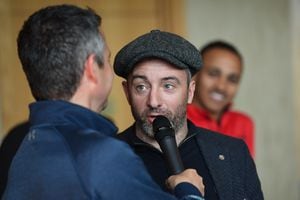
Going down the route of becoming a footballer wasn’t necessarily at the forefront of the mind of the young Hunt as he grew up in Waterford with a family including a sister and three brothers one of whom, Noel, would also make a successful career in the game.
That’s not to say Hunt didn’t have a talent nor indeed an ambition to follow many of his contemporaries who crossed the Irish Sea for trials with English clubs to pursue their dreams.
More so that he was so engrossed and competitive in many different sports!
“I was one of those typical Irish kids, playing every sport I possibly could,” he recalls.
“Hurling, Gaelic football, soccer and golf were the main four.
“I think I would still say golf is the sport where I learned how to be professional, the etiquette, how to conduct myself on and off the pitch if you like.
“The other sports probably helped make me into what I was during my football career, and the defining moment came when I was spotted by Crystal Palace.
“That was when the time came that it was ‘ok, let’s give this a go’, even though when I got there I was still, to a certain degree, very much a boy.
“Palace were a club rooted in London with a lot of talented players on their books so was I ever top of their list? Probably not.
“But an injury to someone else opened up some space for a YTS contract, and it felt like the right thing to do to give it a go.”
It was in the capital firstly at Palace, and then with Brentford, in contrasting circumstances in terms of game time, that Hunt secured a footballing grounding and education which would pave the way for his later success.
He spent four years at Palace, initially as a trainee, coming off the bench on four occasions before also spending four seasons with Brentford, chalking up 160 appearances and chipping in with 29 goals.
Ironically, if it was an injury elsewhere which opened the door to Hunt’s YTS contract at Selhurst Park, it was injuries to himself at both Palace and Brentford which, in the long run, helped define his career as an effervescent winger.
“I think it was at Brentford where my career really took off but Palace was important as a learning curve,” says Hunt.
“I had a few years there which included a broken ankle, but if I hadn’t broken my ankle I don’t think I would have made it as a footballer.
“It gave me the opportunity to get in the gym and make myself strong, I hadn’t had that power or core strength in me before, and that time in the gym just turned me into a much stronger athlete.
“When I came back it was like I was a man, for the first time, playing men’s football.

“At Brentford, in League One, it was a time of highs and lows where initially I put myself on the map, playing a lot of games and scoring some goals.
“But it was another injury that was one of those defining moments, when I picked up a hernia.
“These days a hernia is quickly diagnosed and you have surgery and are back in a few weeks but it wasn’t like that at the start of my career.
“I was doing all the rehab and was still not getting any better so I remember going in to see the surgeon and exaggerating the pain I was feeling.
“He was sticking his finger where you don’t really want to know and I said it was hurting when it wasn’t.
“But from that it meant he opened me up and found it was a hernia, and once it was sorted it relaxed all the tension and gave me movement which I hadn’t previously had in my body.
“It made such a difference that I would even say that it saved my career.”
That increased flexibility and movement helped paved the way for the success Hunt went on to enjoy at Reading, although, as with many incidents during his lengthy career, even moving to the Royals wasn’t without its drama.
Hunt had actually flown in to Bradford for a medical ahead of putting pen to paper on a three-year contract, only to get off the plane to a voicemail from then Reading boss Steve Coppell offering him a move to Berkshire instead of Yorkshire, but on a one-year deal.
Hunt and Coppell had ‘previous’ – he was the manager who gave him his first chance with Palace – and that left him with a big decision to make at such a crucial stage of his career.
“I didn’t have my agent with me but after that phone call I knew what I probably wanted to do but the Bradford owner and chairman persuaded me to go and have the medical before heading to the ground to have a chat,” Hunt explains.
“But after the medical I was sat in the car and I just apologised and said they needed to drop me back at the airport.
“I knew they weren’t happy but the decision just felt right and I flew back to Ireland and went on to join Reading on a one-year contract on the same terms as the three I could have had at Bradford.”
Perhaps a brave call. Not for the first or last time for Hunt. But the rest is history. And Reading made history, Hunt with almost ever-present contributions from the bench as they stormed to the 2005/06 Championship title with a record-breaking tally of 106 points which still stands to this day.
He was more involved as a starter as they finished their first ever Premier League season in eighth and, even though relegation followed, he was still a key influence as they aimed to get back, including two big performances as Reading did the double over Wolves in the 2008/09 season in which the Royals fell at the play-offs as Mick McCarthy’s team won the title.
“I think the eight years at Palace and Brentford laid the foundations for how my career went at Reading,” argues Hunt, who was Royals Player of the Year in 2007/08.
“I think that was the point when I really felt that my relentlessness to succeed as a footballer was starting to work.
“I always had a never-say-die attitude - that wasn’t in question - but my confidence went to a new level and I became unbreakable in my head.
“Life was good, all of a sudden I was earning a bit of money but I was also rich in desire and rich in effort to do well as a footballer and do well in the Premier League.”
Everton had previously shown strong interest in Hunt and, when Reading didn’t make it back to the Promised Land, there were plenty of suitors including talk of Wolves, who already swooped for his team-mate Doyle.
Ultimately though Hull won the day, until their relegation the following season saw McCarthy finally get his man.
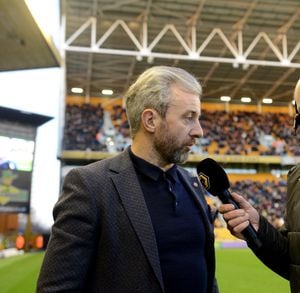
By this time he was already well into a Republic of Ireland career which saw him pick up 39 caps and also secure a place in their squad for the 2012 European Championship.
“I’m not sure how strong Wolves' interest was at that time, but I think I went on to play my best football in that season at Hull,” Hunt continues.
“I had got seven goals by the January and if I hadn’t got injured I don’t think we’d have got relegated because I was having a real influence at the time.
“I’m also not sure I would have ended up at Wolves, because, with no disrespect to Wolves, they were a different club then to what they are now.
“The way I was playing I might have even got a top six team interested but at the same time I was still delighted to come to Wolves and Mick showed his loyalty by actually signing me with the injury and still on crutches.
“Did Mick get the player he thought he was getting and the same one as before the injury? That’s difficult to say.
“He certainly didn’t get me playing at a consistent level and I was never able to put a run of games together when I was at my best and never felt completely happy and comfortable in the surroundings.
“Don’t get me wrong, I loved playing for Wolves, I loved the atmosphere at the games and I loved everything about it.
“But I just don’t think I was as happy in my own skin as I had been at Reading or Hull.
“Football can be like that, it’s not perfect, and sometimes you don’t move to a club and have everything run smoothly.
“The injury will have had a part to play and it felt like for three years I was fighting my body and fighting to get a consistent run of form to get to the level I wanted.
“I had a good run at the end of my first season to help keep us up and remember the games against West Brom and Sunderland in particular and obviously the goal against Blackburn.
“I think that was me, and the team, being on the front foot, because we really needed to win those games, and that sort of approach really suited my game.”
It was certainly a tumultuous three years for Wolves during Hunt’s stay, for good and not so good reasons, or more to the point a bit later on, catastrophic!
That goal against Blackburn, even in defeat, capped a scintillating end to the season as it helped secure Premier League survival, as Hunt described in the Express and Star around the tenth anniversary of the game a couple of months ago.
“I had gone through an exhausting time with injury, and, more than anything else, was just happy to show what I could do and play my part,” he said of what proved a decisive strike.
“I guess thinking about it now, it was a key moment of Wolves’ recent history and, as a player, the sort of moment you live for.”
The following two seasons however proved memorable for very different reasons, back-to-back relegations which, for a character like Hunt, and so many in the dressing room, hurt like hell.
There was a stunned and desolate silence in the dressing room as the double dip was sealed at Brighton, the culmination of a seemingly inexorable decline since that Blackburn escape.
Behind the scenes Hunt had remained focused, determined, always on hand with encouragement or, when needed, one or two home truths.
Hunt would speak when it was needed, and while never shying away from the media, would only carry out interviews when he felt it was the right time to make feelings known as opposed to biting his lip and towing the party line.
He also remembers one occasion when he feeling unhappy with the words of Chairman Steve Morgan and was unable to keep his peace.
“I told the Chairman to be quiet,” he confirms.
“It was when we were struggling and he came to talk to us in a team meeting on a Monday morning and he was questioning our desire.
“I was the only one in the room at the time that wasn’t going to take what he was saying, so I told him to be quiet.
“Although I s*** myself when I did it, my heart was going 130 miles an hour.
“My mind was telling me not to say anything but my heart was saying ‘stuff that, let’s go at it’.
“I wasn’t going to have anyone question my willingness to try hard and I meant that not just for myself but on behalf of the team.
“He didn’t know how we were feeling while we were losing games and I didn’t appreciate him telling us we weren’t trying hard enough.
“Don’t get me wrong, that was how he was feeling and if he wanted to tell us we weren’t good enough then that would have been fair.
“But not trying hard? There are certain values in life that I will hang everything on and giving my best is one of them.
“It was a difficult time throughout the club and to be fair to Steve, later on upstairs at the training ground he told me he respected that I had an opinion and that I had stuck up for myself and the team.
“I suppose that is just my character, and at certain times in my career I have no doubt that speaking my mind has worked against me.”
One feature of his career which certainly provided Hunt with his own difficulties came following a challenge during his first Premier League start for Reading against Chelsea which left opposing goalkeeper Petr Cech with a fractured skull.
Hunt felt it was a ball he had to go for, and obviously had no intent to cause injury and would never have wished the consequences on anyone, with Cech thankfully going on to make a full recovery.
But a large number of Chelsea fans were unable to forgive him – only Hunt could then find himself lining up against them in his debuts for both Hull and Wolves – and it was an incident which stayed with him for the remainder of his career.
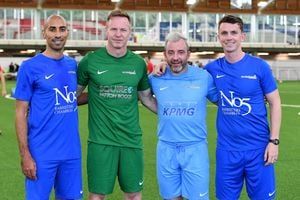
The suggestion that it was perhaps difficult to deal with that sort of attention draws a swift and steely response.
“Listen, whatever has happened to me since then, it was 100 times worse for Petr with his injury, that’s for sure,” Hunt replies.
“I know Petr has a thing about not talking about it at all and I respect and understand that and for that reason I never want to say too much.
“He has since worked with a former team-mate of mine Steve Sidwell, and former goalkeeping coach at Reading, Sal Bibbo, and I just hope that if he had any questions about what I am like as a person then they would have been able to answer them.
“I am just glad he was o-k, god bless, and that is all I can really say – that any of the attention I have had is absolutely nothing to what he had to go through.”
It is perhaps that personality and heart-on-sleeve mentality that endeared Hunt to the fans of the clubs he played for, and why he is still held in positive regard by a large majority of the Molineux faithful despite being part of a squad that suffered those double relegations.
When he was fit and firing, he was a huge asset, notching eight goals and many more assists in 66 games and often likened to the Duracell Bunny in his approach and energy with the quality to match.
His all-round performance in the crucial Black Country Derby win over West Bromwich Albion, and the quality and composure of that crucial second goal against Blackburn, will live long in the memory.
There was far more to his game than just endeavour and attitude, or knowing he would give his best week-in, week-out, but it certainly gave him a firm foundation.
“For me, it should always be a given that any player goes out and gives his best,” Hunt explains.
“And when I say that, I don’t mean by just making sure they run around a lot.
“After all, with the way of the modern game, some players are not expected to run around all the time and so they shouldn’t be judged on that basis.
“By giving their best, for a striker I mean from Monday to Friday, doing extra work on the training ground, practicing their finishing in front of goal.
“Every player in their own position has to work at doing everything they can to be the best in that position.
“Look at Ruben Neves at Wolves – he couldn’t run around as much as Stephen Hunt.
“But Stephen Hunt quite definitely couldn’t strike a ball like Ruben Neves!
“And that hasn’t just happened, Neves hasn’t put on his shooting boots just by turning up on the day.
“He will have practiced day after day, right from early in his career, and continuing to do that now is giving his best for Wolves.
“I also think of Raul Jimenez, and how amazing he has been since coming back from such a terrible injury.
“The way he has conducted himself, the fact he always seems to have a smile on his face, and now he is back and playing well – again, that is him giving his best.”
Hunt, who moved on to play for McCarthy again at Ipswich after leaving Wolves, and then Coventry, is still able to switch off and enjoy family life with his wife and their two young daughters, one of whom is an aspiring showjumper.
“She wants to jump as high as she can every single day, she is ever so slightly competitive,” he reports.
Slightly competitive? No idea where she gets that from.
Still based in the Midlands with the odd trip back home to Ireland, Hunt remains a regular visitor to Molineux for games in his new career, and was representative for Benik Afobe on his return to the club as well as others who have been linked with Wolves.
Prior to last season, he was also involved with a potential deal for Czech Republic defender Vladimir Coufal to move to Molineux, before he eventually joined West Ham.
Hunt’s client base is a strong mix of youth and experience, and has taken several years of seriously hard graft to assemble, including plenty of travelling abroad as he started out.
He is expecting the market to hot up considerably before the end of the window but is already pleased with having secured clubs for six of his younger players who were out of contract, a loan move to Walsall for keeper Carl Rushworth and, at the other end of the scale, Paul McShane landing a role as coach and overage player with Manchester United Under-23s.
It is now five years since Hunt hung up his boots, but all of those experiences, and his ability to talk to team-mates, fans, managers, chairman and owners, must surely stand him in good stead in life as an agent?
“I think there is a football language which I understand and I am able to speak with football people,” Hunt replies.
“I know the value of my players, I know where they are at in terms of what they deserve.
“Agents sometimes get a bad reputation but I think it can be a two-way process and that clubs will sometimes take advantage of players as well.
“With a player like Coufal, he is an exceptional pro and an exceptional talent who deserves all the success and it is seeing players like that progress that makes it all worthwhile.
“I know that I am not going to be right all the time but I will always back my judgement on the players I look after and back my judgement on how I look after them.”
There is perhaps a scenario with a fair wind injury-wise and kinder fortunes, whereby Hunt, with his ability and personality, could have become something of a cult hero at Wolves. He is just the type of player Wolves fans often really warm to.
It didn’t quite happen, but Hunt, who is full of praise for the job carried out by Kenny Jackett after his departure, and then Nuno more recently, is delighted to see Wolves having reached their current heights.
“If I had managed to take my Hull form into Wolves then I think all the fans would have been like ‘who is this guy’?” he adds.
“But none of us are robots, things don’t go right all the time.
“I think the experiences I went through definitely helps in what I am doing now, especially with the younger players.
“They want to progress and they want to get better and sometimes they might find it hard but I can see a way forward for them even when they can’t.
“I can see them getting through the bad times and coming out the other end, because, more often than not, I have been there myself.”
A few years on from flying around the football pitch with his flowing curly hair, the shorter style which has replaced it contains more than a subtle hint of grey. A sign of the stresses and strains of life in football? Or just a new look? More distinguished that’s for sure!
As well as that distinctive hairstyle, Hunt may also have lost some of the rough edges which came from his unbreakable desire and willingness to speak his mind but what he will never lose, as an agent just as a player, is his will to win.
After all, there aren’t many who can get sent off in a Masters-style five-a-side event as Hunt did after repeated clashes with Barry Ferguson at the Star Sixes event in Glasgow a couple of years ago.
Some things change over time, but whether he is 40, 41, or however old, there’s a drive and determination in Stephen Hunt that will be around for a good while yet.

